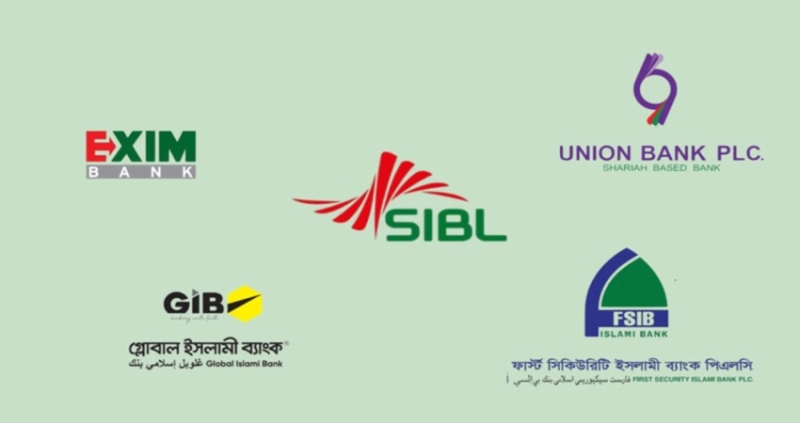News update
- Five Shariah Banks to Merge Into State-run Sammilito Islami Bank |
- Dhaka’s air ‘unhealthy for sensitive groups’ Wednesday morning |
- US proposes that the UN authorize a Gaza stabilization force for 2 years |
- Democrat Zohran Mamdani is elected New York City mayor |
- Martyr Mugdha's brother Snigdha steps into politics with BNP |
Five Shariah Banks to Merge Into State-run Sammilito Islami Bank
Staff Correspondent:
Banking
2025-11-05, 5:16pm

Logos of five financially troubled Shariah-based banks
Bangladesh Bank has announced a major restructuring of the Islamic banking sector by declaring five financially troubled Shariah-based banks inoperative and dissolving their respective boards. These banks — First Security Islami Bank PLC, Global Islami Bank PLC, Union Bank PLC, EXIM Bank PLC and Social Islami Bank PLC — will now be merged into a new state-owned institution named Sammilito Islami Bank Limited. The move is aimed at safeguarding depositors and restoring stability in the sector, which has faced prolonged liquidity stress and governance failures.
Despite the suspension of their boards, all customer services will continue without interruption. Bangladesh Bank has assured that daily banking functions such as withdrawals, deposits, cheque clearing, ATM and digital banking operations will proceed normally. Central bank-appointed administrators will manage the banks during the transition period.
The decision follows months of review by the Department of Financial Institutions and approval by the National Economic Council’s Advisory Committee. Bangladesh Bank officials stated that the five banks had reached a point where independent survival was no longer sustainable. Years of mismanagement, weak internal controls and questionable lending practices resulted in severe capital shortfalls, high levels of non-performing financing, diminishing asset quality and eroding public confidence. In some cases, defaulted loans accounted for over 40 percent of total loan portfolios, while repeated emergency liquidity support from the central bank did little to stabilise their condition.
Under the merger framework, all liabilities, deposits, loan assets, branch networks and employees of the five banks will be absorbed into the new government-owned entity. Over 650 branches nationwide will gradually be brought under a unified operational structure. An interim management committee appointed by Bangladesh Bank will supervise the integration, with full operational unification expected within 90 days. The new bank will follow Shariah banking principles, but with significantly tighter oversight and strengthened prudential regulations to ensure transparency and financial discipline.
Senior executives of the affected banks were called to the central bank on Wednesday and formally briefed on the dissolution of their boards and the transition plan. The Governor is scheduled to provide further details, including preliminary audit findings, in a public statement later in the day.
This consolidation marks the largest banking restructuring in Bangladesh’s history, signalling a firmer regulatory stance against weak governance and unchecked lending in the financial sector. Bangladesh Bank has also formed a special investigative cell to examine previous board-level decisions, related-party lending and financial irregularities. A white paper documenting the causes of the crisis and outlining future reforms will be made public.
Customers have been advised to continue their regular banking activities as usual, with branding and administrative updates to be communicated in phases.

